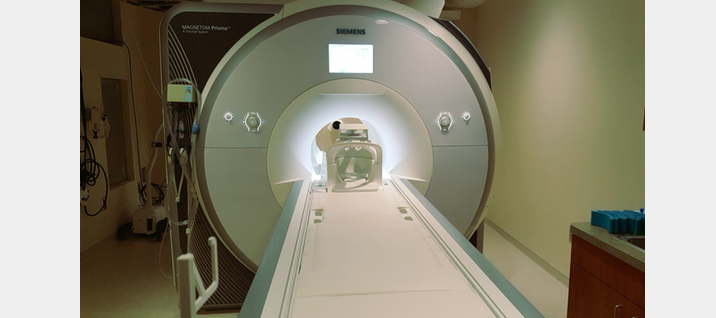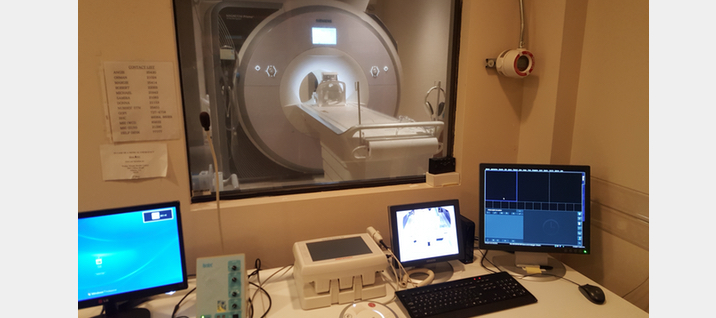Siemens PrismaFIT 3T at HSRB-II
MRI scanner
This Siemens Magnetom PrismaFIT whole-body MR system is equipped with
- a state-of-the art gradient system with a maximum (per axis) strength of 80 mT/m and slew rate of 200 T/m/sec
- 64 independent RF receiver channels capable of 204 receiver connections
- a 2-channel RF transmitter
Multiple coils are available, including
- a 64-channel head/neck coil with 52 channels for imaging of the head region
- a 32-channel head-only coil
- a 20-channel head/neck coil with 16 channels for head
- spine array coil
- flexible chest coil
- large and small flexible coil for extremity imaging.
It runs the Siemens Syngo VE11C software. In addition, the scanners are equipped with DirectRF and DirectConnect technology, providing a significant increase in signal-to-noise ratio. The Prisma scanner platform allows efficient acquisition of high-resolution fMRI and DTI images with protocols comparable to those released by the Human Connectome Project.
A number of advanced research sequences are also available, including
- Vessel Size Imaging
- quantitative Arterial Spin Labeling
- Diffusion Spectrum Imaging (for High Angular Resolution Diffusion Imaging)
- Simultaneous Multi-Slice EPI (allowing for sub-second high-resolution whole-brain fMRI data acquisition)
- displacement encoding (DENSE)
- multi-echo and ultra-short echo time sequences.
With our master research agreement with the vendor, advanced work-in-progress MR sequences from the vendor, collaborators from other institutions, or locally developed sequences can be deployed.

Siemens Magnetom PrismaFIT 3T at HSRB-II
Stimulus and response system for functional MRI
This MR scanner is equipped with peripheral systems for fMRI.
- Stimulus/response controls for behavioral tasks concurrent with fMRI are supported by an array of hardware specifically designed to allow investigator flexibility and precision.
- Visual presentation is provided by a high resolution LCD projection system (1400x1050 SXGA, 4200 lumens, 1300:1 contrast ratio) delivered from the back of the suite onto a custom fit screen mounted within the bore behind the participant's head.
- Audio presentation is provided by an Avotec Silent Scan 3100 that has been calibrated to maintain sound pressure levels that are dependent directly on input (flat frequency response +/- 4dB, 200-4500Hz range).
- A fiber-optic ergonomic bilateral button response system from Psychology Software Tools supports responses from fMRI subject.

MRI Control area at HSRB-II
Other Equipment
A Biopac MP150 (Goleta, CA) MRI-compatible physiological response measurement system is available for collecting peripheral physiological measures. The MP150 system provides high resolution (16 bit), variable sample rates for analog and calculation channels, 16 analog inputs and two analog outputs, digital I/O lines (automatically control other TTL level equipment), and 16 online calculation channels. The MP150 System provides high-speed acquisition (400 kHz aggregate) via an Ethernet connection to a host computer. AcqKnowledge, the Biopac control and analysis software package is used to control the acquisition and can be used for data analysis. Available physiological measures are
- cardiac pulse
- heart rate
- heart period
- respiratory sinus arrhythmia
- respiration
- electrodermal activity.